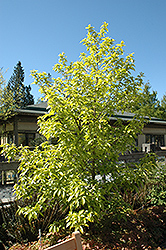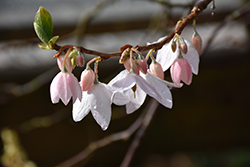It's all about ...
plants

Chinese Parasol Tree
Melliodendron xylocarpum
Height: 50 feet
Spread: 30 feet
Sunlight:
![]()
Hardiness Zone: 7b
Other Names: Chinese Honey Tree
Description:
A large tree producing a dense canopy of rectangular foliage; bathed in lovely pink blooms in spring that fade to white, with egg shaped fruit in summer and fall; an impressive landscape accent
Ornamental Features
Chinese Parasol Tree is bathed in stunning nodding pink star-shaped flowers with white overtones at the ends of the branches from late spring to early summer. It has attractive green deciduous foliage which emerges chartreuse in spring. The glossy pointy leaves are highly ornamental but do not develop any appreciable fall colour. The fruits are showy brown pods displayed from mid summer to mid fall.
Landscape Attributes
Chinese Parasol Tree is a deciduous tree with an upright spreading habit of growth. Its average texture blends into the landscape, but can be balanced by one or two finer or coarser trees or shrubs for an effective composition.
This is a relatively low maintenance tree, and should only be pruned after flowering to avoid removing any of the current season's flowers. It is a good choice for attracting birds and bees to your yard. It has no significant negative characteristics.
Chinese Parasol Tree is recommended for the following landscape applications;
- Accent
- Shade
- Vertical Accent
Planting & Growing
Chinese Parasol Tree will grow to be about 50 feet tall at maturity, with a spread of 30 feet. It has a high canopy with a typical clearance of 7 feet from the ground, and should not be planted underneath power lines. As it matures, the lower branches of this tree can be strategically removed to create a high enough canopy to support unobstructed human traffic underneath. It grows at a medium rate, and under ideal conditions can be expected to live for 60 years or more.
This tree should only be grown in full sunlight. It prefers to grow in average to moist conditions, and shouldn't be allowed to dry out. It is not particular as to soil type or pH. It is somewhat tolerant of urban pollution. This species is not originally from North America.
This plant is not reliably hardy in our region, and certain restrictions may apply; contact the store for more information.

